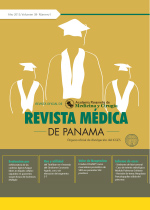Síndrome de Realimentación
Autores/as
DOI:
https://doi.org/10.37980/im.journal.rmdp.20232201Palabras clave:
Síndrome de realimentación, Nutrición, HipofosfatemiaResumen
El Síndrome de Realimentación (SR) ocurre posterior a la reintroducción de dieta enteral, parenteral u oral en pacientes con malnutrición; caracterizándose por alteraciones metabólicas y electrolíticas que aparecen cinco días después de la introducción del aporte calórico. Su incidencia y mortalidad es variable debido a la baja sospecha diagnóstica y desconocimiento del tema. La aparición de las manifestaciones clínicas depende de la alteración electrolítica; por lo general afectando múltiples sistemas. La prevención se basa en la identificación de individuos con factores de riesgo, instaurar un régimen nutricional adecuado y constante monitorización durante la realimentación. El manejo multidisciplinario es dirigido a la corrección de los trastornos hidroelectrolíticos y correcto inicio y optimización de la nutrición. Representa una entidad subdiagnosticada ya que no existen criterios universalmente establecidos. A pesar de que hoy en día, existe mayor conocimiento sobre la fisiología y fisiopatología de la enfermedad, la presentación inespecífica de los síntomas requiere un alto grado de sospecha para el diagnóstico. Por esta razón, la importancia de esta revisión.
Archivos adicionales
Publicado
Número
Sección
Licencia
Derechos de autor 2023 Infomedic Intl.Derechos autoriales y de reproducibilidad. La Revista Médica de Panama es un ente académico, sin fines de lucro, que forma parte de la Academia Panameña de Medicina y Cirugía. Sus publicaciones son de tipo acceso gratuito de su contenido para uso individual y académico, sin restricción. Los derechos autoriales de cada artículo son retenidos por sus autores. Al Publicar en la Revista, el autor otorga Licencia permanente, exclusiva, e irrevocable a la Sociedad para la edición del manuscrito, y otorga a la empresa editorial, Infomedic International Licencia de uso de distribución, indexación y comercial exclusiva, permanente e irrevocable de su contenido y para la generación de productos y servicios derivados del mismo. En caso que el autor obtenga la licencia CC BY, el artículo y sus derivados son de libre acceso y distribución.






